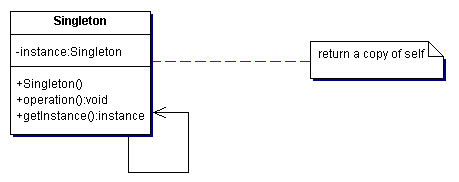Singleton
Intent
Ensure a class has only one instance, and provide a global point of
access to it.
Problem
Application needs one, and only one, instance of an object. Additionally,
lazy initialization and global access are necessary.
Discussion
Make the class of the single instance object responsible for creation,
initialization, access, and enforcement. Declare the instance as a
private static data member. Provide a public static member function
that encapsulates all initialization code, and provides access to the
instance.
The client calls the accessor function (using the class name and scope
resolution operator) whenever a reference to the single instance is
required.
Singleton should be considered only if all three of the following
criteria are satisfied:
- Ownership of the single instance cannot be reasonably assigned
- Lazy initialization is desirable
- Global access is not otherwise provided for
If ownership of the single instance, when and how initialization
occurs, and global access are not issues, Singleton is not sufficiently
interesting.
The Singleton pattern can be extended to support access to an
application-specific number of instances.
The "static member function accessor" approach will not support
subclassing of the Singleton class. If subclassing is desired, refer
to the discussion in the book.
Deleting a Singleton class/instance is a non-trivial design problem.
See "To kill a Singleton" by John Vlissides (C++ Report,
Jun 96, pp10-19) for a discussion.
Structure

Example
The Singleton pattern ensures that a class has only one instance and
provides a global point of access to that instance. It is named after
the singleton set, which is defined to be a set containing one
element. The office of the President of the United States is a
Singleton. The United States Constitution specifies the means by which
a president is elected, limits the term of office, and defines the
order of succession. As a result, there can be at most one active
president at any given time. Regardless of the personal identity of
the active president, the title, "The President of the United States"
is a global point of access that identifies the person in the office.
[Michael Duell, "Non-software examples of software design
patterns", Object Magazine, Jul 97, p54]
Non-software example
Opinions
"Singleton is not going to solve global data problems. When I think of
Singleton, I think of a pattern that allows me to ensure a class has
only one instance. As far as global data, the only benefit I see is
reducing the namespace." [Christopher Parrinello]
"This is not really the point, but I always teach Composite, Strategy,
Template Method, and Factory Method before I teach Singleton. They are
much more common, and most people are probably already using the last
two. The advantage of Singleton over global variables is that you are
absolutely sure of the number of instances when you use Singleton, and,
you can change your mind and manage any number of instances." [Ralph
Johnson]
Our group had a bad habit of using global data, so I did a study group
on Singleton. The next thing I know Singletons appeared everywhere and
none of the problems related to global data went away. The answer to
the global data question is not, "Make it a Singleton." The answer is,
"Why in the hell are you using global data?" Changing the name doesn't
change the problem. In fact, it may make it worse because it gives you
the opportunity to say, "Well I'm not doing that, I'm doing this" -
even though this and that are the same thing. [Frieder Knauss]
Rules of thumb
Abstract Factory, Builder, and Prototype can use Singleton in their
implementation. [GOF, p134]
Facade objects are often Singletons because only one Facade object is
required. [GOF, p193]
State objects are often Singletons. [GOF, p313]
C++ Demos | Lab

